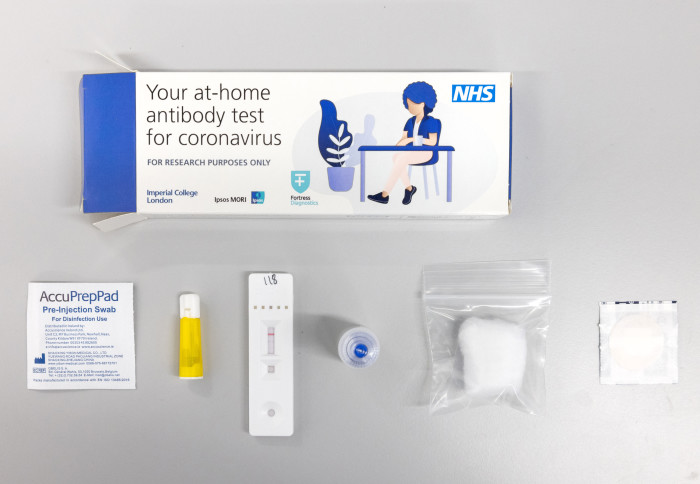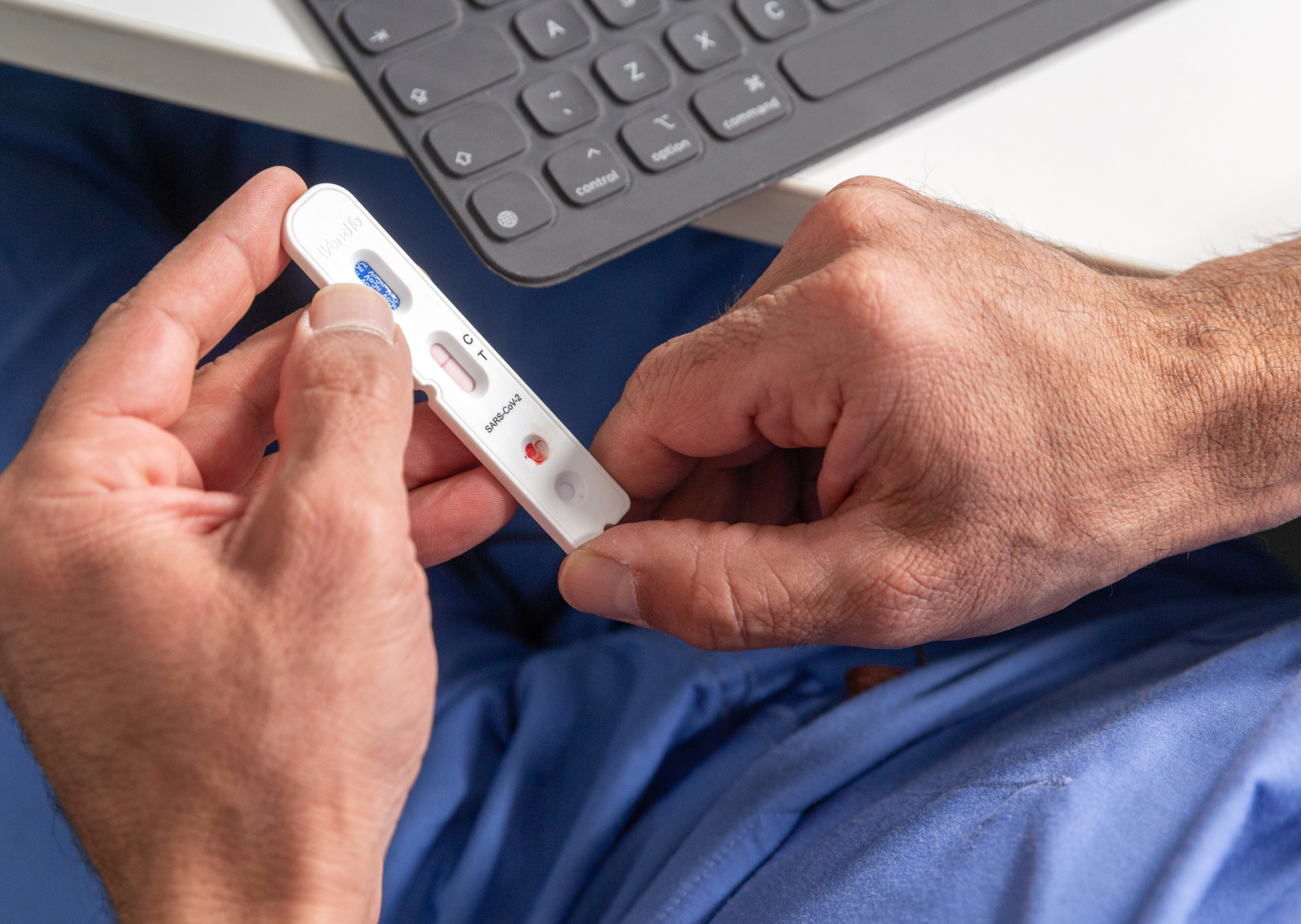Almost all double vaccinated people in England have antibodies to coronavirus

New findings from a major coronavirus antibody surveillance survey show the impact of England’s vaccination programme on antibodies in the population.
Tests carried out by more than 207,000 adults between 12th and 25th May 2021 reveal that close to 100% of people had antibodies to the virus two weeks after receiving their second dose of Pfizer/BioNTech or AstraZeneca. The figure dropped slightly with age, falling to 98% in those aged 80 and above who had received Pfizer/BioNTech and 84% for AstraZeneca, according to the latest data from the Imperial-led REACT-2 study.
"It’s concerning that coverage of vaccines is uneven with people in some groups and areas less likely to have been vaccinated and therefore may remain relatively unprotected from future spread." Prof Helen Ward School of Public Health
The presence of antibodies varied more in people who had received a single dose, both across age groups and by vaccine type. The lowest prevalence was found in people aged 70 and over at 32% three weeks after Pfizer/BioNTech and 46% for AstraZeneca.
The body produces antibodies after infection and vaccination, and it’s thought that people with detectable antibodies to the coronavirus may have protection from future illness.
The presence of antibodies alone - especially in unvaccinated people - does not necessarily prevent infection. However evidence shows that both doses of a vaccine offer high levels of protection.
The study found high vaccination rates with 73% of adults reporting that they had received one or more doses, ranging from almost all (99%) of those aged 75 and above to 25% in those aged 18-24. But there was variation in coverage with men, people from deprived areas, those working in public-facing roles such as retail and hospitality, and people who identify as Black among those with lower rates.
Professor Helen Ward, Professor of Public Health at Imperial, said: “Results of this very large study show the substantial impact of the vaccination programme on antibody positivity in adults. However, it’s concerning that coverage of vaccines is uneven with people in some groups and areas less likely to have been vaccinated and therefore may remain relatively unprotected from future spread. We need to continue and intensify efforts to reach these groups with vaccination, and to ensure other protective measures are in place.”
These findings from the ongoing REal-time Assessment of Community Transmission (REACT-2) programme, led by Imperial and carried out in partnership with Ipsos MORI, are available here in a pre-print report and will be submitted for peer-review.
Tracking coronavirus antibody prevalence
For the study, 207,337 people randomly selected from across the country took a finger-prick test at home to check for coronavirus antibodies, called a Lateral Flow Test. The research team previously evaluated these tests in the lab to find out how accurate they are, and used this information to estimate antibody prevalence.
"We think higher levels of antibody are likely to be needed to protect against the delta variant, rates of which are rising fast." Prof Graham Cooke Department of Infectious Disease
Overall, around six in 10 adults (61%) in England had antibodies in May 2021, up from one in seven (14%) in January, and one in 17 (6%) in November. For people over the age of 75 prevalence was 95%, and 90% for those aged 65 and above. For those aged 18-24 - a quarter of whom reported having had at least one vaccine dose - the prevalence was 36%.
For people who had received the Pfizer/BioNTech vaccine, antibody prevalence was 100% two weeks after the second dose for all age groups under the age of 80, above which it dropped to 97.8%. For AstraZeneca prevalence was 100% in those aged 18-39, and then gradually fell with age to 83.6% in those aged 80 and above. But after a single dose there was a much bigger range in the antibody response, from 100% in 18-24-year-olds three weeks after Pfizer/BioNTech to 32.3% in those aged 70 and above. For AstraZeneca the range was 72.2% to 46.2%.
After a single dose, the proportion of people testing positive for antibodies peaked around 4-5 weeks later and then began to decline, followed by a marked boost in those who had their second dose at 6-8 weeks or 10-12 weeks.
Professor Graham Cooke, NIHR Research Professor of Infectious Diseases at Imperial, said: “A far higher proportion of participants had detectable antibodies after two vaccine doses, with more variability after only one. It's key that all those who can get their second doses in a timely way, even if they've had COVID-19 before. This is particularly important now as we think higher levels of antibody are likely to be needed to protect against the delta variant, rates of which are rising fast."

"Our findings reinforce the need to get fully vaccinated to protect yourself and those around you." Prof Paul Elliott School of Public Health
Professor Paul Elliott, Professor of Epidemiology and Public Health Medicine at Imperial and Director of the REACT programme, said: “Antibodies play an important role in protecting against future illness, which is why our REACT programme has been tracking coronavirus antibodies in the population since early on in the pandemic. So it's very encouraging to see a greater than 4-fold increase in antibody prevalence since our last findings in January, highlighting the impact of the vaccination programme. More importantly, our findings also reinforce the need to get fully vaccinated to protect yourself and those around you."
Uneven COVID-19 vaccine coverage
Since the previous testing round, which ran between 25 January and 8 February 2021, vaccine confidence has risen with an increase in the proportion of people who had accepted or would take a vaccine, across all age groups. Similarly the proportion of people who said they wouldn’t take one has shrunk.
"I urge everyone to come forward for the vaccine, regardless of your race, religion or background." Sajid Javid Health and Social Care Secretary
Health and Social Care Secretary Sajid Javid said: “Every vaccine is another brick in our wall of protection and I’m incredibly pleased that the latest data from REACT shows almost 100% of people tested positive for antibodies after their second dose of the vaccine.
“This is a testament to the very high level of protection the vaccine provides – with 46,000 hospitalisations prevented and 30,000 lives saved. I urge everyone to come forward for the vaccine, regardless of your race, religion or background. It could save your life and protect your loved ones, and getting the second jab will help us all return to doing the things we love.”
At the time of the study, almost three-quarters of people had received at least one dose of a COVID-19 vaccine, but coverage was uneven. Men were 11% less likely than women to have been vaccinated, and also 30% less likely to test positive for antibodies than women.
People from the most deprived areas were 17% less likely, and those from the least deprived were 17% more likely, to have been vaccinated compared to those who fell in the middle of this range.
Those who work in retail, hospitality, and personal care such as hairdressing were 20-30% less likely to have been vaccinated than other workers. Vaccine coverage was 14% higher in people who identify as Asian, and 60% lower in people who identify as Black, compared to people of White ethnicity. And those who had previously had COVID-19 were 40% less likely to have had a vaccine compared to those who hadn’t.
By region, London had the lowest vaccination rates with 64.5% of adults having received at least one dose, while Yorkshire and the Humber and East Midlands had the highest at around 75%.
“As we lift restrictions next week, I urge anyone who has yet to be vaccinated to get both jabs to protect yourselves and your loved ones." Nadhim Zahawe Vaccines Minister
Vaccines Minister Nadhim Zahawi said: “It is incredibly reassuring to see nearly every single person who took part in the REACT study developed detectable antibodies following two doses of the vaccine. It goes to show once again how two doses are vital for the best possible protection.
“Our vaccination programme is working and is severely weakening the link between cases, hospitalisations and deaths. We are continuing to make strong progress in boosting uptake for people living in deprived areas, as well as black and minority ethnic communities by working closely with faith and local leaders.
“As we lift restrictions next week, I urge anyone who has yet to be vaccinated to get both jabs to protect yourselves and your loved ones. Vaccines are safe and have so far prevented around 8 million infections, over 46,000 hospitalisations and around 30,000 deaths.”
Article text (excluding photos or graphics) © Imperial College London.
Photos and graphics subject to third party copyright used with permission or © Imperial College London.
Reporter
Justine Alford
Institute of Global Health Innovation